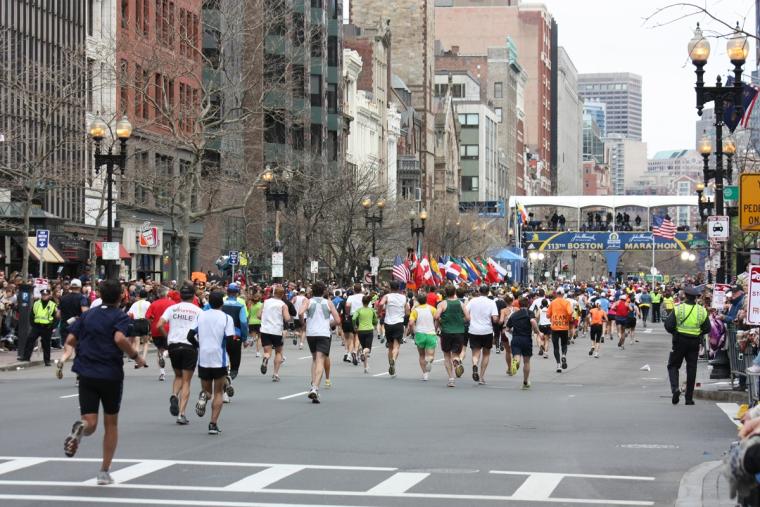
The Boston Marathon is one of the most exclusive, elite races in the U.S., which makes it a target for those who want to get into it illegally (such as by cutting the course or having someone else run under your name in a qualifying race). One marathon sleuth is out to stop the cheats. Photo © Marcos Souza | Dreamstime.com
Cheating in some sports is easier than cheating in other sports. In the world of marathon running, racers can use fake bibs or take shortcuts along the course. In fact, breaking the rules is so common that BusinessInsider.com published “Nine of the most brazen marathon cheats of all time” a couple years ago.
Crafty internet users have been ratting out the cheaters for years with photographic evidence and fake online posts. In recent months, Derek Murphy, who runs MarathonInvestigation.com, has been particularly busy.
Perhaps the biggest story on his site lately is about the return of Jo Bartlett, who also competes under the names Jo Benson and Emily Clark. Bartlett was disqualified from a recent marathon (one whose organizers asked Murphy not to name) because she rode a bicycle during the first half.
Murphy‚ once described by SDM editor Mary Helen Sprecher as “Steve Kornacki, only without the white shirt and tie, and solely devoted to crunching marathon finish times,” chronicles Bartlett’s documented and reported exploits (which also includes the launch of fundraising campaigns under various identities).
In April, Murphy explained to readers that one of the most common forms of marathon cheating is bib muling, which “refers to allowing another person to run under your name, often to achieve a time standard for an exclusive race. It’s a form of race cheating and a violation of race rules and ethics.”
After doing some digging and reviewing photographic and video evidence, Murphy confirmed that a participant in the 2023 California International Marathon (CIM) did not complete it himself.

“Instead, a bib mule ran under his name and submitted a Boston-qualifying time, which was later used to register for the 2025 Boston Marathon,” Murphy wrote, adding that the runner’s name was removed from the official 2023 CIM results.
“When a runner gains entry into a race like the Boston Marathon by using someone else to run a qualifying race on their behalf, it’s not just a technical violation, it’s a fundamental breach of the spirit of the sport,” Murphy wrote. “Some view these types of investigations as minor or unnecessary. But they are absolutely necessary to maintain the integrity of the sport. With limited fields in races like Boston, every spot taken fraudulently is one less spot for a runner who earned it honestly.”
Other cheating methods include use of unregistered pacers or unofficial supporters, race bandits who run in events they didn’t register (and pay) for and, in the case of ultramarathons, utilizing a car along part of the course.
So why do marathoners cheat? Craig Lewis, host of the “Running Tales” podcast and Substack, offers up several reasons:
The lure of a finisher’s medals and bragging rights, particularly those afforded by a top three finish, are obvious answers.
Others cheat for a fast time or to meet a goal, such as a Boston Marathon qualifying time.
Many people may believe they are entitled to finisher’s medals as they will have paid sometimes considerable amounts to enter a race. If they feel they are struggling to hit a cut-off time the desire to cheat may become too much.
On other occasions runners give in to pressure to hit targets they’ve set, or even boasted about. In a world where social media is so often king, who wants to own up to a DNF or to finishing an hour outside the time you wanted?
… But in a world where some people will even cut a corner at a free event such as parkrun, where there is supposedly no winner, is the answer simply that certain runners, like all parts of society, are not very good people?
That’s a tough question to answer, but it’s one worth thinking about for event organizers heading into fall marathon season.

